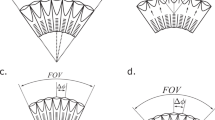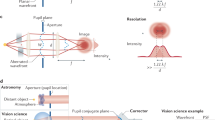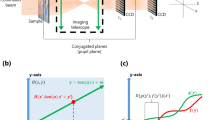Abstract
IN connexion with an investigation into the mechanism of vision of some Arthropoda it was necessary to determine the refractive index, n, of the dioptric tissues of an ommatidium. Owing to the small dimension of these tissues, even in such a big insect as the dragon fly, Aeschna, it would be very difficult to measure this index with ordinary refractometers because the cells in question cannot be separated without damage. Thus n must be determined directly by using histological sections. Due to the fact that cells are never absolutely homogeneous it is possible to determine only an average value of the index. Therefore, the more accurate but circumstantial methods can be replaced by the old and well-known methods of de Chaulnes (1768) if improved in the following way in which only a modern microscope together with a special glass slide device are needed.
This is a preview of subscription content, access via your institution
Access options
Subscribe to this journal
Receive 51 print issues and online access
$199.00 per year
only $3.90 per issue
Buy this article
- Purchase on Springer Link
- Instant access to full article PDF
Prices may be subject to local taxes which are calculated during checkout
Similar content being viewed by others
Author information
Authors and Affiliations
Rights and permissions
About this article
Cite this article
RYDBERG, H. Determination of Refraction Index and Thickness of Histological Sections. Nature 196, 1002–1003 (1962). https://doi.org/10.1038/1961002a0
Issue Date:
DOI: https://doi.org/10.1038/1961002a0
Comments
By submitting a comment you agree to abide by our Terms and Community Guidelines. If you find something abusive or that does not comply with our terms or guidelines please flag it as inappropriate.



